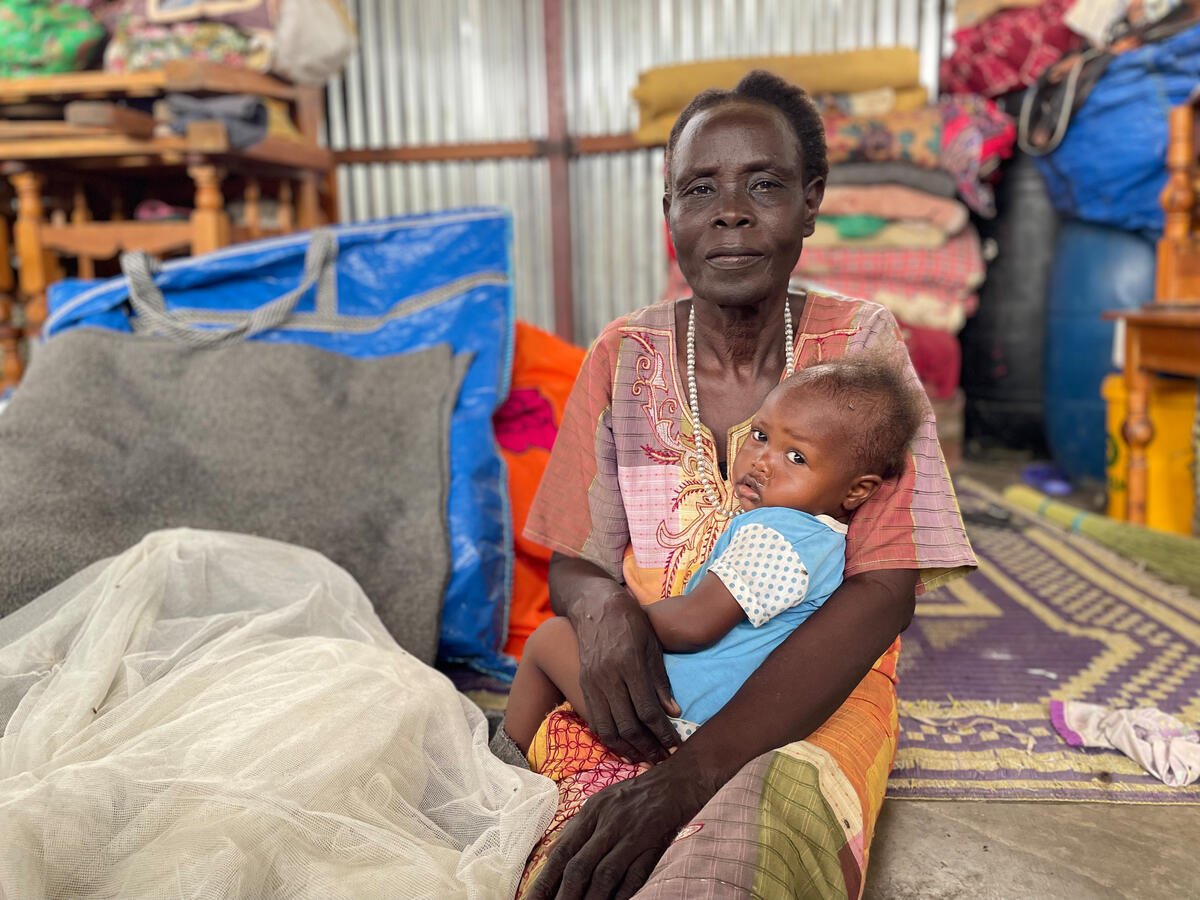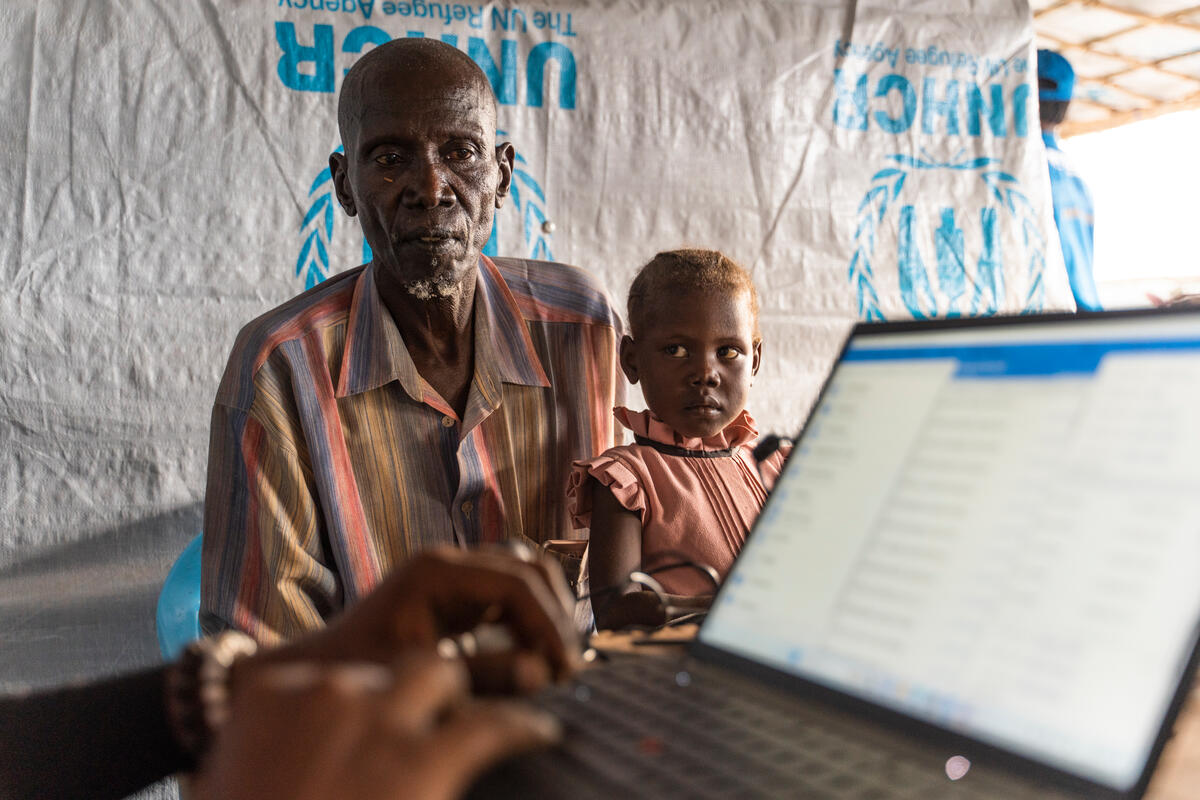Valentin Tapsoba, UNHCR Southern Africa Bureau Director, looks back on 30 years of service.
Valentin Tapsoba, UNHCR Southern Africa Bureau Director, looks back on 30 years of service.

UNHCR Bureau Director for Southern Africa Valentin Tapsoba (in white UNHCR vest) meets with refugees at the transit center in Dzaleka camp, Malawi.
After responding to an advertisement in The Economist, which called for people to assist UNHCR in Somalia, 35-year-old Valentin, from Burkina Faso, found himself on a flight to the war-torn country about to begin his first assignment with the UN Refugee Agency.
Valentin Tapsoba talked to UNHCR's Hélène Caux about his long career and the lessons he drew from the agency, colleagues, and refugees.
What was your first assignment in Somalia like?
I took on my role as an Administration and Finance Officer in Bardera in 1993, in the coastal region of northern Somalia. This was an eye-opening experience because for the first time, I witnessed firsthand how conflict as well as drought had a negative and far-reaching impact on peoples’ lives. My assignment was to make sure UNHCR saved lives, reduced suffering and distributed assistance like potable water and plastic sheeting. It was during this time that I better understood the importance of humanitarian work and became passionate about it! I could go to sleep every night, confident that I had made a difference. Humanitarian work would not only become my calling. It would also be my life.
What is the most memorable assignment you had that stands out for you today?
Rwanda. I arrived in Kigali, the capital, on 30 January 1994 and three months later, the genocide started. Over UN radio handsets, you could hear colleagues calling, crying, pleading for help. The capital was under lockdown with check points everywhere. Some local colleagues managed to find refuge in my home, but when a drunk group of militias claiming that someone from the property was firing at them arrived at my house, I was terrified. Fortunately, they walked away when they found out I was a UN humanitarian worker, and they didn’t find the colleagues in hiding. If they had, I wouldn’t be alive today to tell this story.
I was the only international UNHCR staff member who had not been evacuated yet. I was then transferred from the house by a German battalion to a stadium, where later that evening a rocket blast killed 30 people right in front of me. I managed to leave the country on a military plane that had brought food and water from Nairobi, 24 hours before the deadline from the Rwandan Patriotic Front to leave the country expired.
Having escaped death, how did this traumatic experience shape your vision of humanitarian work and your future with UNHCR?
During a situation like this, you are always on an adrenaline high. When I came off the high, I knew I hadn’t achieved my life’s work as a humanitarian worker. Instead, my experience in Rwanda made me even more determined to continue providing protection and assistance to displaced people wherever I was assigned. Even though I was offered counselling and psychological treatment, I opted for time off with my family before I resumed service with UNHCR in Guinea Conakry.
You have held assignments in Afghanistan, Burundi and were representative in Sierra Leone and Ethiopia before moving to Geneva as Africa Bureau Director. What would you say is the project you are the proudest of?
The project I am proudest of is when I was Deputy Representative in charge of Operations in Burundi from 2005 to 2008. Refugee returnees from Tanzania had had access to education there. They were returning home after the Burundian civil war of 1993 to 2005, to places with no schools and educational support. My concern was young Burundian returnees who were at risk of becoming a second generation without education, after their parents had been deprived of schooling. I took it on myself to ensure that these children would go to school.
I engaged with donors like the US Bureau of Population, Refugees and Migration arguing that if people are educated, they will be more inclined to resolve conflict and settle their differences verbally, than with AK 47s and machetes. Today, some of those children are national and professional staff in UNHCR, still thanking me for having fought to have schools. Education is key.

What leadership principles have guided your decision-making at UNHCR?
Leadership is really the ability to get things done through the extraordinary achievements of the colleagues on your teams. It is making sure that you can inspire people to deliver their very best performance and keeping them motivated to do so. Treat your team with respect and patience. Manage people the way you would like to be managed. Ensure that everyone understands their role fully and has all the tools needed to fulfil them. If they don't, support them. Provide learning, training, and improvement opportunities. These are leadership skills.
What advice would you give to someone aspiring to take a leadership role at UNHCR?
You need to have a vision. You need to be very transparent. To promote a culture of equity. You need to be respectful, have integrity, verbal, and written communication. Don’t just hear people speak, learn to listen to what they say. Lastly, I would add trust and accountability.
What makes UNHCR unique?
UNHCR is about saving lives especially in emergency situations. If we don't act within 72 hours, then we are going to likely lose lives. When you are watching men, women, children crossing an international border, fleeing for their lives and you are there providing protection, giving them water, high protein biscuits, caring about the elderly, lactating and pregnant women, finding them shelter, you know you are contributing to help people in need.
How has UNHCR evolved during the 30 years you worked for the agency?
When I joined UNHCR, the workforce and budget were small. Today we have more than 110 million people we work with and for and our budget of some US$ 414 million at the time, has increased exponentially to between US$10 to US$11 billion. Humanitarian crises are skyrocketing across the world. There are more refugees, asylum seekers, stateless people, but fewer resources. This will lead to negative coping mechanisms like children dropping out of schools, teenage pregnancies, early marriage. It has truly become very complicated to really protect the people we work with worldwide.
Also, the way aid workers are viewed has changed tremendously, for the worst. Thirty years ago, being a humanitarian worker ensured protection, today you can easily become a target.
What are some of the challenges you faced in your current – and last – position as Bureau Director for the Southern Africa region?
I have been very impacted by the situation in the DRC. The civilian population is constantly attacked by non-state armed groups, fleeing violence and living precariously in transit or makeshift shelters. Our colleagues have been threatened, harassed, killed, and kidnapped. As of 1 December 2023, at least 6 million people have been displaced by conflict in the country. In addition, the accounts we have of gender-based violence are horrific. Displaced women are attacked and molested as they go to farms and fields in search of food and water to feed their families. Young girls cannot go to school because their lives have been destroyed. To make ends meet and to support their families, women and girls as young as 13 and 14 are forced to engage in prostitution, including in dozens of brothels in the east of the country. The DRC has an extremely complicated and worrying situation.
Also, when I came to Southern Africa in 2019, after a year we were hit very hard by Covid 19. It was a very difficult time. We could no longer conduct business as usual. We needed to adapt very quickly so that we could still efficiently protect the people under our mandate. So, as many of our colleagues globally, we stayed and delivered; we continued to provide assistance to refugees and displaced people in the region.

We’ve talked about the future of UNHCR. What about your future?
I am retiring from UNHCR, but not retiring from life! Retiring means that we also need to give space to the younger generation. I am thinking of doing voluntary work with non-governmental organizations or foundations in the field of education at a later stage. The education of girls is close to my heart. This would be my way to continue giving back, especially after my country put me through primary and secondary education.
At the end of the day, as Nelson Mandela said, “What counts in life is not the mere fact that we have lived. It is the difference we have made to the lives of others.”
Is there any further message you would like to convey?
A big thank you to UNHCR and colleagues, past and present. I don't take my time with UNHCR for granted. It has been a rollercoaster, but one worth the ride!








